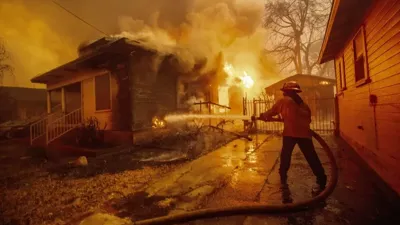Fires can cause devastating damage to homes, belongings, and lives. While no one wants to imagine such a disaster, being prepared with the right insurance coverage can make all the difference. Fire insurance is a crucial step in protecting your financial stability and peace of mind. This guide explores everything you need to know about fire insurance, from what it covers to how to purchase it.
![]()
What is Fire Insurance Coverage?
Fire insurance coverage pays for damages and losses you incur in the event of a fire. It covers the replacement cost of your personal belongings, as well as additional living expenses in case you have to temporarily move out of your home.
Is Fire Already Covered by Your Property Insurance?
Homeowners insurance covers your home and belongings against several types of hazards, also called “named perils.” Fire is one of the 16 named perils included in your standard homeowners insurance policy. If a fire causes damages or losses to your place or belongings, your insurance company will provide financial assistance for replacements or repairs.
Fire and smoke damage, such as ruined clothing or furniture, is typically included in renters and homeowners insurance policies. The smoke damage does not have to originate from a fire in your residence; for example, smoke damage from a neighbor’s fire would still be covered.
Why Purchase Fire Insurance?
If fire protection is already included in your policy, you may wonder why additional coverage is necessary. While your homeowners insurance policy offers fire protection, policy limits might cap your coverage, making it insufficient in certain situations.
Standalone fire insurance can cover losses and damages exceeding your property coverage limit. This type of insurance is particularly valuable for:
Covering replacement and reconstruction costs in the event your home is completely destroyed by fire.
Providing additional protection if your property is located in a wildfire-prone area, where some standard insurance policies exclude fire coverage.
What Fire Insurance Covers
Fire insurance policies provide comprehensive protection for several scenarios, including:
- Fire Caused by Short Circuits: Fires originating from electrical malfunctions in your apartment are covered.
- Fire from Excluded Sources: Even if the fire’s root cause isn’t covered (e.g., a flood indirectly causing a fire), fire insurance ensures your damages are reimbursed.
- Smoke or Water Damage: Beyond fire damage, related smoke and water damage may also be covered for up to a year, which isn’t usually included in standard policies.
- Loss of Use: If fire damage renders your home uninhabitable, fire insurance covers additional living expenses such as hotel stays, laundry services, and meals.
Keep all receipts for extra expenses, as your insurance provider will require them for reimbursement during the claims process.
![]()
What Fire Insurance Doesn’t Cover
Fire insurance comes with certain exclusions. These include:
- Arson: Fires intentionally caused by you or someone else on the policy.
- Negligence: Fires resulting from reckless or unreasonable actions may be excluded.
War, Contamination, or Nuclear Radiation: Damages arising from these events are not covered. - Vacant Homes: Properties left unoccupied for over 30 days before the fire may not qualify for coverage.
How Much Does Fire Insurance Cost?
The cost of fire insurance depends on several factors:
- Home Value and Contents: Higher coverage limits for expensive homes and belongings increase premiums.
- Location: Homes in high-risk wildfire areas tend to have higher fire insurance premiums.
- Deductibles: Choosing a higher deductible can lower your premiums.
- Additional Features: Coverage for extra living expenses, water damage, or extended liability might raise the overall cost.
On average, homeowners pay $100–$500 annually for standalone fire insurance, though prices can vary significantly based on the specifics of your property and risk factors.
How to Purchase Fire Insurance
Purchasing fire insurance involves the following steps:
- Assess Your Needs: Determine the value of your home and belongings, as well as any additional risks associated with your location.
- Compare Providers: Obtain quotes from multiple insurance providers to compare costs and coverage options.
- Understand Policy Details: Read the terms and exclusions carefully to ensure the policy meets your requirements.
- Bundle Policies: Consider bundling fire insurance with homeowners insurance for potential discounts.
How Fire Insurance Works
In the unfortunate event of a house fire, follow these steps to file a claim:
- Contact Your Insurance Agent: Notify them immediately and initiate the claims process.
- Document Damages: Take photos and keep detailed records of damaged or lost items, including their monetary value.
- Identify the Cause: Determine how and where the fire started to provide necessary details for the claim.
- Work with the Adjuster: An adjuster will assess the damage and help finalize your claim.
Conclusion
Fire insurance is an essential safeguard for protecting your home and possessions against devastating losses. While your standard homeowners insurance may include some fire protection, standalone fire insurance ensures comprehensive coverage, particularly in high-risk areas or for larger losses. By understanding the costs, benefits, and exclusions, you can make an informed decision about the protection your home truly needs.


